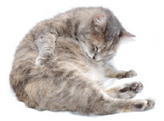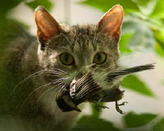Allergies in Cats

Allergies in cats are similar... yet different to ours. When we have an allergy we sniffle and sneeze, our eyes water and we get congested. But if your cat is allergic, most won't sniffle, but itch. However, a few will react like you do. Cat allergic responses vary and the immune system sometimes overreacts. Cat allergy symptoms differ...such as cat health itching.
This itchiness (pruritus)prompts allergic cats to groom excessively and scratch and bite at their fur...even creating bald spots. They may also develop skin lesions such as the rice-seed-sized crusts of military dermatitis or the ulcers, plaques, or nodules of eosinophilic granuloma complex. These lesions can eventually lead to bacterial infections of the skin.
However, the outlook is good if your cat does have a cat allergy symptom. The most important thing is to try to determine the cause. Once you isolate the culprit, you can control the allergy by minimizing your cat's exposure to the substance.
Allergies in cats occur because the body's immune system responds above and beyond the call of duty. Normally, the immune system kicks in only when it encounters harmful foreign invaders such as bacteria, viruses, and toxins. But in an allergic response, the immune system overreacts and goes to battle over relatively harmless substances such as flea saliva, dust or food ingredients.
Once these substances have been tagged as the enemy, the body develops a hypersensitivity to them. Then, when one of these allergens comes on the scene, the immune system's mast cells spew out substances such as histamines that cause inflammation and itching. Some types of allergies in cats...especially inhalant allergies ...appear to have a genetic component. In other allergies, environmental factors seem to be more important.
The most common allergies in cats are those caused by fleas, inhalants, food, and drugs. Fleas, or rather the fleas saliva, is the prime offender. In a highly flea-allergic cat, one or two flea bites can create intense itchiness. But because such an animal may not have visible fleas or flea dirt, the allergy may be difficult to diagnose.
Less commonly, allergies in cats develop to some airborne substances. These inhalant allergies (atopy) are even harder to pin down than flea allergies because there are so many different substances in the air that could cause a reaction ...including pollen, molds, and house dust. If a veterinarian suspects an inhalant allergy, he may recommend an intradermal test wherein tiny amounts of common airborne allergens are injected into an area of the cat's skin. Intradermal testing can also be used to identify a flea allergy. Such testing occasionally produces false negatives and false positives, but the procedure can help narrow the range of suspected allergens.
Allergies to foods:
Allergies to foods are relatively uncommon in cats, but when a cat's diet appears to be causing a problem, food allergies are often first to take the blame. In a true food allergy, the reaction (itching or vomiting, and diarrhea) sets in only after the cat has already been exposed to a food at least once. Studies suggest that feline food allergies most often involve reactions to beef, dairy products or fish. To pinpoint the particular cause of a food allergy (once other possible causes of itchiness or gastrointestinal distress have been ruled out), vets usually prescribe an elimination diet.
Elimination diets contain only novel sources of protein and carbohydrates, those not found in the animal's previous diet. If your cat does indeed have a food allergy, an elimination diet should bring an end to the allergic signs in about 4-6 weeks although some cats can take up to 10 weeks to respond. While on the special diet, your cat should consume only that food (and water) and nothing else...no treats, chewtoys, cat grass etc.
Always consult with your vet before you put your pet on an elimination diet. Food allergies are relatively rare, so your vet will need to rule out other possible causes of your cat's itchiness or gastrointestinal distress before resorting to a diet change. Also, while some commercially available foods look like elimination diets (in particular, lamb-and-rice or venison-and-rice formulations), most of these foods contain other ingredients. If your cat has eaten these ingredients before, she may be allergic to them. Also, don't try a homemade elimination diet unless you have your vet's okay. Most homemade diets aren't nutritionally complete.
Drug allergies are the least common type of allergies in cats. While cats do occasionally develop an allergic hypersensitivity to oral, topical or injected medications and vaccines, such reactions are relatively easy to diagnose once the vet reviews the cat's medical history. If your cat develops itchiness or any other reaction after taking a drug or receiving a vaccination, be sure to inform your vet right away.
To control a food or drug allergy, the trick is simply to identify the problem substance and avoid future exposure. Allergies to flea saliva are more difficult to manage but are less of a problem than they once were because of advances in flea prevention and control. Inhalant allergies in cats can be especially tough to beat. If you know the specific allergen and it's seasonal...for example, ragweed pollen...you could keep your cat indoors with the windows shut when the allergen is at its height. The situation is more difficult for cats that are allergic to household substances such as molds, and house dust ...which are in the air year-round. It may help to confine your cat to an area of the house free of dust collectors like books, carpets, and mattresses. You may also want to equip your cat's living space with a HEPA (high-efficiency particulate air) filter.
Allergies in cats may wax and wane, but they won't go away on their own. And while all these allergy-management techniques may seem like a lot of trouble to go to for a bit of itchy skin or sniffling, they're worth it from your cat's point of view. An itchy cat is a miserable cat. Some can do damage to themselves by scratching and biting with unusual vigor. Fight the battle for your cat's comfort.
Related Articles......
Return from Allergies in Cats to Cat Health Homepage
Having trouble finding what you need? Cat Health Index & Site Map
OR
Do you have a question to ask?...Questions
OR
Do you have a cat story to share?...Simply click here to go to that page!
Copyright@2010-2020 All rights reserved.Cat-health-detective.com
This website is information only. Consult a veterinarian for medical assistance

"Like Us" on Facebook
or...
"Like Us" here




















